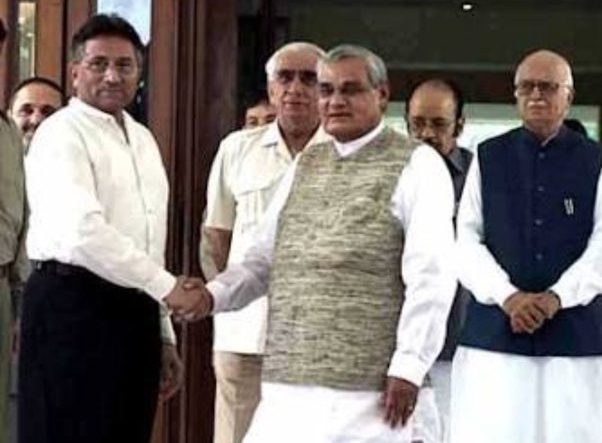Mayank Chhaya-
In the passing at age 79 of the disgraced former president, General Pervez Musharraf the world has witnessed the end of a quintessential Pakistani strongman whose perpetual angst was against India, but whose delusions of influence were global.
Musharraf died in Dubai in exile from a country he once ruled with varying draconian degrees, including suspending its Constitution, imposing martial law and making widespread civilian arrests. That was just one part of his preoccupations, the others being setting off a reckless war with India over the Himalayan region of Kargil in between May and July 1999 and running with the hare and hunting with the hounds during the Afghan war waged by the U.S. from 2002. On the face of it, he seemed to have closely allied with America in its feckless invasion of Afghanistan even while being indulgent towards with both the Taliban and Osama bin Laden.
Although born in Delhi on August 11, 1943, Musharraf built his entire career harboring profound animus against India, especially in the aftermath of the 1971 war with India in which then Prime Minister Indira Gandhi triumphed gloriously handing Pakistan a humiliating defeating and creating a whole new country, Bangladesh. He took part in that action as a young officer and internalized its humiliation.
It is believed that the 1971 humiliation was something Musharraf never forgot, and that conflict profoundly shaped his military career. The 1999 Kargil misadventure embarked on by him practically without the consent of the then civilian Prime Minister Nawaz Sharif was his way of trying to get at least partly even with India for 1971. It did not pan out that way. The Kargil war was particularly foolish as it came a little over a year after Prime Minister Atal Bihari Vajpayee ordered a nuclear test in May, 1998, much to the world’s chagrin and unbeknownst to it. That was followed by Pakistan’s own nuclear test. That the two recently nuclear-armed neighbors with a history of perpetual hostility would witness one of them trigger a wholly unnecessary war was symptomatic of Musharraf’s subcontinental view.
Although Musharraf spent his entire military career apparently trying to exorcise his India demon, many observers believe in his heart it mattered a great deal to him what India thought of him which was not much. That, however, did not prevent him from frequently enjoying Hindi cinema music and occasionally even singing a song or two such as “Chal ud ja re panchhi, Ab yeh desh hua begana” from the 1957 film ‘Bhabhi’. The song’s message was instructive as it spoke of exhorting a bird to fly away leaving behind an unfriendly land. His office, of course, denied he ever indulged himself with that particular song.
Musharraf was seen as a complex figure with a capacity for unexpectedly off-the-beaten-track thinking. For instance, in 2006, when Dr, Manmohan Singh was India’s Prime Minister, he proposed a radical solution for the forever-festering Kashmir problem. In essence, he said Pakistan would be willing to give up its claim on Kashmir if India accepted a self-government plan under which the region would have wide-ranging autonomy and self-governance supervised by both India and Pakistan. The four-point solution included a gradual withdrawal of troops by both, self-governance, unchanged borders and bilateral supervision. Despite its potential the proposal did not eventually work.
Having joined the Pakistani army in 1961, Musharraf took part in all the wars with India, including the defining 1971 conflict. It was his decades of military engagement from his side of the border that profoundly shaped his strong detestation for India even while nursing some soft corners.
He saw himself in the mold of the Turkish revolutionary and statesman Mustafa Kemal Atatürk and it is possible that in many of his dealings with the West generally and America particularly, he channeled some of that. It was quite remarkable that throughout his engagement with the United States after 9/11 he managed to ride two horses, one international and another domestic even though more often than not they seemed to be galloping apart.
Musharraf leaves behind a legacy that is predominantly troubled and sinister with occasional high points as having strengthened Pakistan’s economy somewhat. His country is likely to mourn him only grudgingly, especially when Prime Minister Shehbaz Sharif, the younger brother of former Prime Minister Nawaz Sharif, whom he overthrew in a coup in 1999, is in power now.




